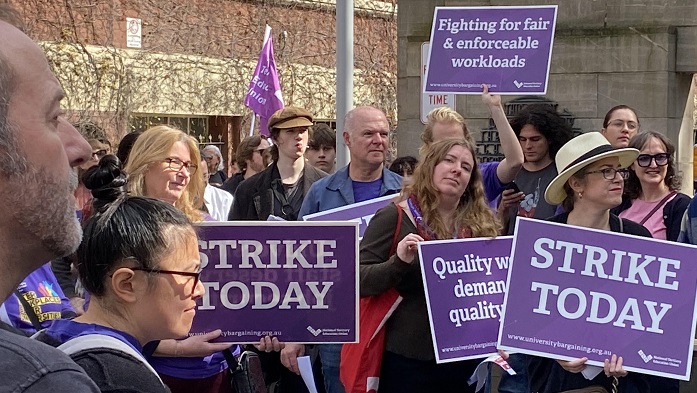NATIONAL: Federal public servants, members of the Community and Public Sector Union, struck for 24 hours on 9 October.
The action affected only Services Australia (Centrelink). Union officials are focusing on what they regard as “key” agencies and are not calling out all 15,000 members of the union.
But rank-and-file resistance to the government’s poor offer of 11.2 per cent over three years has led to balloting for industrial action at the Department of Employment and Workplace Relations, the Fair Work Ombudsman, the Australian Competition and Consumer Commission and the Department of Agriculture Fisheries and Forestry.
The officials’ strategy means the full weight of the union is not brought to bear upon a Labor government, which is desperate to prove wage-capping credentials to the bosses.
NATIONAL: Wharfies at DP World stevedore, members of the Maritime Union of Australia, are striking twice for 24 hours at Fremantle, Melbourne, Brisbane and Sydney.
MUA members have imposed an eight-hour ban on working any ship after it’s tied up and are refusing to call off action for talks, instead offering to talk between actions.
The MUA and DP World have been negotiating for six months. DP World wants to introduce so-called “flexible rostering” with unsociable hours and cut pay up to 32 per cent, according to the MUA.
MELBOURNE: University workers, members of the NTEU, stepped up their EBA fight across multiple campuses.
At the University of Melbourne, workers struck last week for 4.5 days while members at Monash and RMIT escalated their action, walking out for two days and 1.5 days respectively.
Management continues to play hardball. The University of Melbourne is offering one of the worst pay deals among the Group of Eight prestigious universities and its offer on permanent work is shot through with escape clauses.
At RMIT, management is bringing on another non-union ballot at RMIT Training and has threatened to sell the business if the deal is rejected.
NTEU members will need to organise for even stronger action involving more members in early 2024.
BRISBANE: More than 10,000 construction workers, members of the CFMEU, marched on WorkSafe on 14 September, calling on the Palaszczuk Labor government to lift its game in terms of safety inspections on construction sites.
It comes after a 54-year-old worker at the state government flagship Cross River rail project recently left hospital after falling 12 metres from scaffolding in July. The project has been issued with 300 safety enforcement notices.
One construction worker told Solidarity that WorkSafe was “still stacked with Liberal Newman’s appointees and it even has an ex-ABCC grub in there. The inspectors never act against dodgy builders. It’s on orders from the top”.
The union is angry that a review of the WHS Act, completed last December, hasn’t addressed the issue of female toilets on major sites, increased training for heavy machinery operators and safety committees to be formed on larger building sites.
The government is set to amend the WHS Act by the end of the year. But the union plans “repeated rallies” until next year’s state election in October.
NATIONAL: About 1000 members of the Retail and Fast Food Workers Union went on a two-hour strike last Saturday at Coles and Woolworths.
It is said to be the first coordinated supermarket strike in Australian history.
NATIONAL: Retail workers at three Mint My Desk stationery chain stores went on strike on 2 September for minimum award pay and conditions. They held another stop-work protest on 6 September.
The mostly young and female workforce has been underpaid by the chain, which has 20 east coast stores.
Workers say the company has been engaging in illegal practices such as payment in cash, and failure to pay super and penalty rates.
SYDNEY: Dozens of workers at Bega Dairy products, members of the UWU, walked off on 25 September in an indefinite strike.
The strikers make Dare milk products and Dairy Farmers milk in Penrith. They are after a 7 per cent pay rise in the first year of the EBA and then 5 per cent in the subsequent two years.
Bega is offering only 4 per cent in the first year and 3.75 per cent in the next two years.
The strikers have a hardship fund.
SYDNEY: Some 15 TWU members at Cleanaway liquid waste in Padstow went on strike for a second time in late September over the long weekend and returned to work on Tuesday 3 October.
They represent 100 per cent of the specialised liquid waste collection workforce and businesses across Sydney were affected.
The workers are striking to defend entitlements, conditions and job security. Cleanaway’s net income in 2021 was $153 million.
WESTERN AUSTRALIA: Members of the Offshore Alliance, which unites the AWU and MUA, are threatening renewed action at Chevron’s two huge LNG plants after the company reneged on an element of an earlier agreement.
After two weeks of industrial action, the unions and Chevron struck an in-principle agreement on 22 September.
The deal included allowances for remote working of $103,000 a year on the offshore Wheatstone gas platform and of $85,000 a year for those at the onshore LNG plants at Wheatstone and Gorgon.
Chevron also agreed to a confidential “job security” deed that essentially protects the jobs at the facilities.
Gorgon and Wheatstone produce 7 per cent of global LNG supplies. Chevron is the last fossil-fuel company to sign a union agreement in the WA’s northern gasfields.
WESTERN AUSTRALIA: Pilots flying for Network Aviation, a Qantas subsidiary that operates in WA under the QantasLink banner, struck for 24 hours in response to what they said was a complete breakdown in negotiations.
Qantas said about half its regional flights were cancelled and that about 3,500 customers were booked on other flights.
ADELAIDE: Tram drivers, members of the Rail Tram and Bus Union, at Torrens Connect suspended their strike action on 4 September.
Drivers had previously rejected the company’s below-inflation offer of 12.5 per cent over three years and the use of split-shifts with long gaps in between.
MELBOURNE: The Rail Tram and Bus Union reached an in-principle agreement with Metro for a below-inflation pay rise four days before a train drivers’ four-hour strike was due on 6 October.
With drivers voting to strike, the union has thrown away a great chance to get better than the agreed 4 per cent per year for four years plus 1 per cent for the new underground tunnel line, due to open in 2025.
By Tom Orsag






